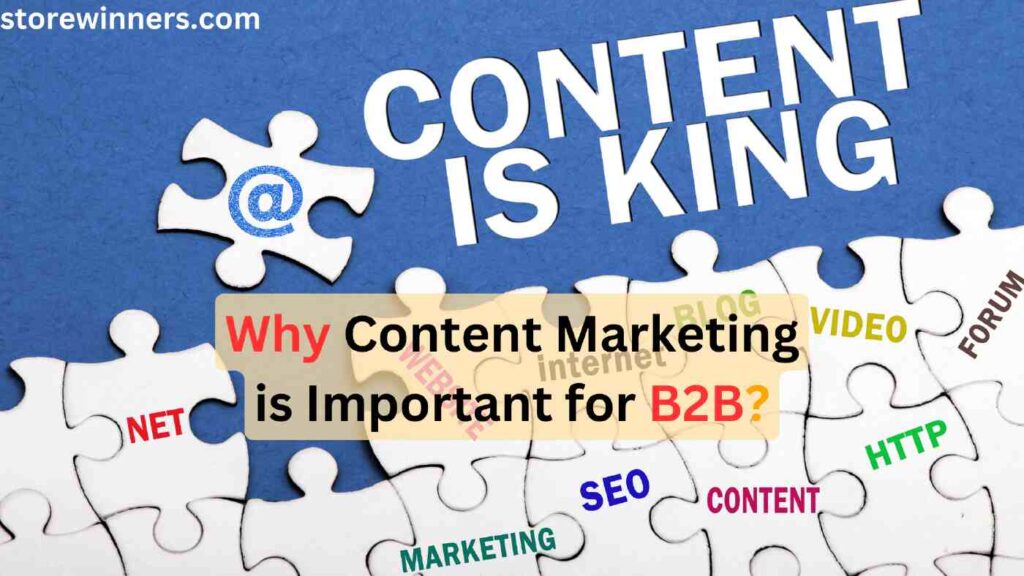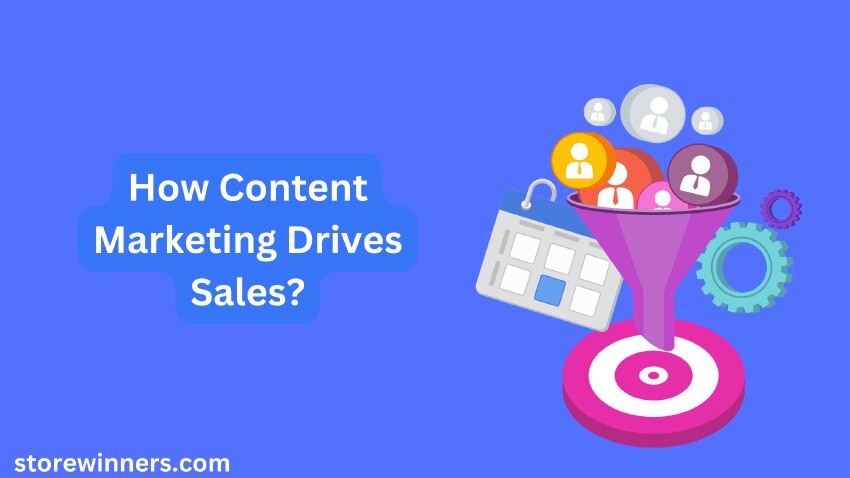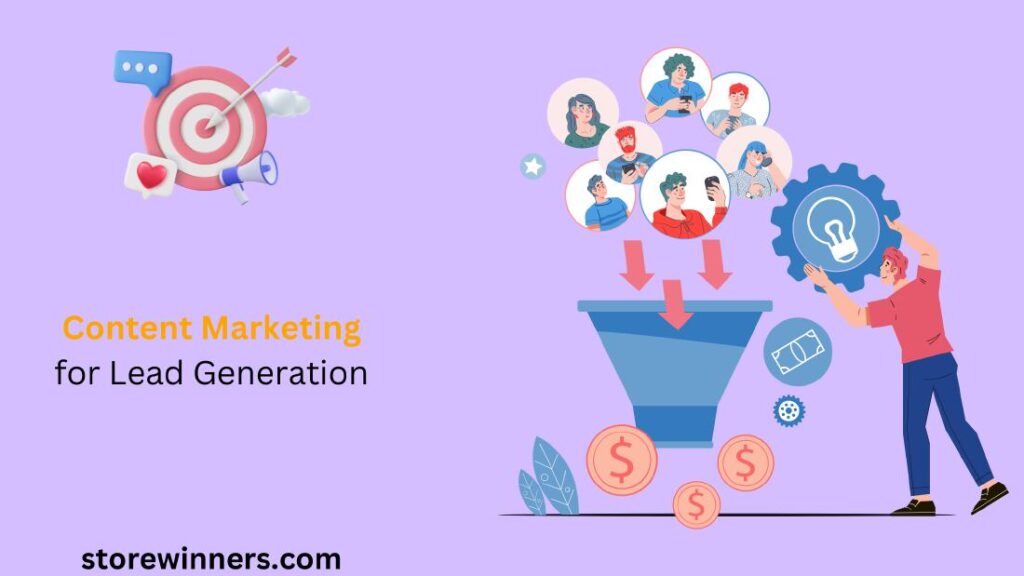The question arise why content marketing is important for B2B businesses? Businesses need to use smart marketing tactics that help them stand out and stay ahead of the curve in today’s highly competitive business world. Content marketing is one of these strategies that has worked really well for B2B companies.
This complete guide will explain why content marketing is important for B2B companies, what its benefits are, and how you can plan and carry it out successfully in your own company. This blog post is a must-read for anyone who wants to use the power of content marketing, whether they are a new business or an established one that wants to step up their game. That being said, let’s look at why it’s time for B2B companies to put their content plan first!
Building Trust Through Valuable Content

Establishing Authority in the Industry
When you give your audience useful and relevant information instead of direct sales pitches, it helps you build your authority and knowledge. It puts your business in a leading position and shows that you want to help other people solve their problems. As you write more intelligent material that helps people and answers their questions, they will see you as an expert.
Creating Long-Term Relationships
When you consistently post content that is current and up-to-date, your readers will quickly come to know and trust your brand. A strategy that builds trust through educational material is a great way to leave a lasting impact on both new and returning customers.
Enhancing Brand Credibility
When demonstrating to your potential client and consumers that you are knowledgeable and willing to provide useful information, it helps in creating your brand as a reliable authority. This is also a massive opportunity for informed content marketing is important for B2B. Generating and sharing worthy materials is an ongoing process while developing a unique value proposition.
Then, if well executed, your firm is regarded as an opinion leader within its distinct segment; consequently, confidence follows. The logical consequence of trust. Your content enjoys the trust of your target audience. A great foundation for every sales team to close a sale.
Improving Search Engine Rankings

SEO Benefits of Quality Content
The quality of content is the cornerstone of effective SEO. By creating highly interactive and engaging contents which are keyword targeted and well linked, you tell Google that your contents are relevant and trustworthy; hence ranking it higher in search engine result pages attracting more traffic. It helps to optimize your website’s content for capturing new customers.
Organic Traffic Growth
With 68% of online experiences now starting with a search engine, it is essential for your business to appear at or near the top of results. B2B buyers who search for solutions are more likely to research specific problems or information rather than type in a company name.
According to Google research, more than 70% of B2B buyers begin with a generic search rather than a branded one. You need content marketing.
Staying Ahead of Competitors
The strong content marketing associates keywords which buyers use when seeking information about the brand being promoted. This helps drive search engine optimization (SEO) and improve your rankings in Google and other search engines.
It has been proved that best practices like keyword research, grammatically correct content, headings optimization as well as regular updating of content will keep you ahead of competition.
Also Read: A Step-by-Step Guide to Content Marketing for Lead Generation
Cost Efficiency and Lead Generation

Reducing Cost Per Lead
Acquiring new customers is one of the most expensive activities for any business. You can significantly cut down customer acquisition costs (CACs) by building a library of good quality content. The more you produce, the cheaper it gets per lead.
Maximizing Marketing Budget
Your content is a weapon that your sales teams can use. As soon as your content starts converting (e.g., when someone fills out a form in a downloadable offer),you change the way you approach some things and then come with another healthy resource.
Generating High-Quality Leads
Being able to capture high-quality leads may be among the reasons why your firm might consider investing in content marketing. All firms desire to produce good leads, which is exactly what content marketing does.
Inbound content marketing enables creation of cost-effective strategies as well as leveraging upon leads that have started falling into place so as to create content best suited for a particular segment of customers.
Versatility Across Multiple Channels

Repurposing Content for Different Platforms
Content is highly flexible; thus, where consumers are more visually oriented let them know about your business through videos, infographics and photos or if they need to go into details on certain issues then long-form articles, blogs and eBooks should work better for them. Repurposing content allows you to reach different segments of your audience effectively.
Consistency in Brand Messaging
To publish on multiple platforms is the life-force of your content marketing is important for B2B. So, again, it’s where your audience spends a lot of its time. Finally this just means that you have to decide which channels make sense for your business and then how to get your content out via those channels.
By keeping consistent brand messaging across these channels then of course the audience will received an integrated and coherent message.
Engaging Diverse Audiences
Targeting more than one audience increases probability of higher conversions. In addition, this is good practice in this field because most content marketers claim that they focus on three audiences within their entire content strategy. Engaging diverse audiences will also give you an opportunity to tell success stories from customers as well as widen your presence.
Connecting with the Core Business Purpose

Aligning Content with Business Goals
Content marketing must be tied to the core business purpose – serving customers and impacting bottom-line revenues. If you understand what makes them tick, how they feel about it, interact with it when used in B2B settings, then it can help ensure that your B2B content is something personal and relevant for the needs of your client base. This alignment means that such marketing material isn’t just noise but also becomes a strategic asset that contributes towards achieving organizational goals.
Serving Customer Needs
When you ask important, meaningful questions to your B2B peers, you build relationships that get stronger over time. In turn, this builds a strong link, which raises the lifetime value of your customers and turns guests into lasting customers. At the heart of good content marketing is knowing what your customers want and giving it to them.
Impacting the Bottom Line
Content marketing is good for the business-to-business (B2B) sector because it lowers the cost per lead and makes materials that can be used in a variety of ways and on all platforms. Because these benefits have a direct effect on the bottom line, content marketing is an approach that saves money. It can be hard to get people on board, but showing them the return on investment (ROI) of content marketing can help. Key performance indicators (KPIs) tracking and content efficiency analysis are two very important steps in this process.
Standing Out in a Crowded Market

Breaking Through Advertising Clutter
It’s always been hard to stand out among all the ads, but with today’s technology, your best outbound marketing and standard outreach efforts might not even get past the technology to reach potential buyers. They’ll do anything to stay away from you until they’re ready to talk to you on their own terms.
Delivering Targeted Content
Make material for every step of the buyer journey, from researching to engaging to buying, so that you can meet the needs of every customer, no matter what part of the process they’re in. Since there is a lot of competition in the tech business, you should always think about what your target market wants. This will likely give you an edge over your competitors.
Building a Memorable Brand
This is very important in today’s world of fierce competition. Every day, new businesses come out and try to steal your customers. Content marketing helps you build and keep your image so that you can beat out competitors.
Measuring Success and ROI

Tracking Key Performance Indicators
Keep an eye on key performance indicators (KPIs) to see how well your content marketing is doing. By showing you what is working and what isn’t, these KPIs let you make changes to your plan. Here are some basic KPIs that B2B content planners might use:
- Total impressions / total views: The total number of times your content has been seen by your audience, indicating your reach.
- Engagement metrics: Other than likes and comments, people will connect with your material in other ways.
- Conversion rates: The number of people who do what you want them to do after reading your content, like filling out a form or buying something.
- Lead generation: The amount of new leads that your content marketing has brought you.
Analyzing Content Effectiveness
When attempting to determine the level of success that your content has achieved, it is necessary to examine both quantitative and qualitative data. The content score is a tool that may be utilized to determine the extent to which your material generates leads, maintains their attention, and ultimately converted them into customers.
In addition, you may determine what works best by using the A/B testing method to test out various components of your website, such as headlines, calls to action, and graphics. Dynamic content placement allows you to adjust things based on how people act, which makes them much more valuable than conventional content placement.
Demonstrating ROI to Stakeholders
Providing stakeholders with evidence of a return on investment (ROI) is necessary in order to get support for your content marketing activities. To do this, you will need to provide outcomes that are unambiguous, measurable, and in accordance with the objectives of your company. Construct comprehensive reports using the data obtained from your key performance indicators (KPIs) and content analysis.
Case studies and success stories can also be used in your marketing materials to assist establish confidence in your business and give social proof. At the end of the day, you need to demonstrate how the content marketing you do contributes to the bottom line of your company.
Conclusion
Therefore, content marketing is an important strategy for B2B businesses that want to build trust, become more visible, and get leads without spending a lot of money. Businesses can better engage their target audience than with standard ads by giving them useful and relevant material.
Content marketing not only helps your site rank better in search engines, but it also gives you content that you can use in a lot of different ways. It’s becoming more and more important to be able to connect with possible clients through meaningful material as the digital world gets busier. Adding content marketing to your B2B plan is not only a good idea, it’s necessary for long-term growth and success.
FAQs
Q1: Why is content marketing important for B2B companies?
A1: It assists in the development of brand awareness, leads to the establishment of thought leadership, and fosters long-term connections with customers.
Q2: How does content marketing drive lead generation for B2B companies?
A2: For the purpose of following up with prospects, by presenting them with excellent material that attracts and engages them, and by collecting their contact information.
Q3: What types of content are most effective for B2B marketing?
A3: white papers, case studies, eBooks, webinars, reports on the industry, blog entries, infographics, and videos are all examples of content types.
Q4: How can B2B companies measure the success of their content marketing efforts?
A4: Through the utilization of technologies such as Google Analytics, the tracking of metrics such as website traffic, lead generation, engagement, and conversion rates may be accomplished.
Also Read:



